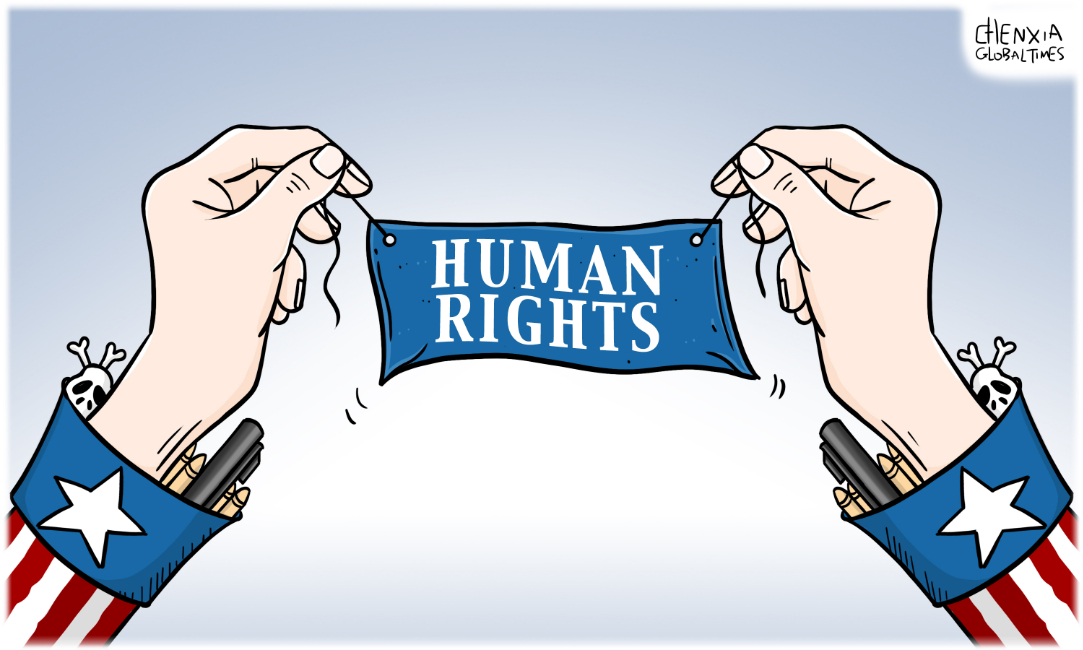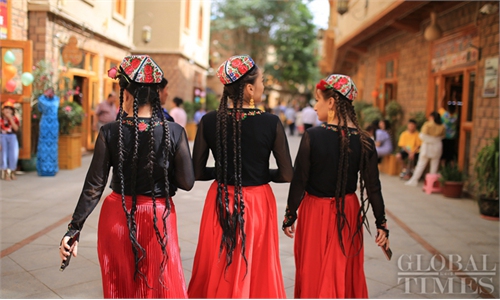History must not repeat itself – let the UN do its work in Xinjiang without US meddling

Illustration: Chen Xia/GT
If you believe some commentators in the West, the visit to China by the United Nations human rights chief Michelle Bachelet, which starts on Monday - the first by a UN High Commissioner on Human Rights since 2005 - is over before it has even started.
In fact, for some observers, she would be better cancelling the trip altogether, despite it having taken several years to arrange, because there are many who have already decided that the findings of her inquiry will not be worth the paper they are written on.
Why is this so?
Bachelet has had an advance team in Guangzhou, in South China, since April ahead of the tour which will visit the Xinjiang Uygur autonomous region in the west of the country
And this is where the interest of those US backed groups is focused: Xinjiang. For years, there have been stories in the West of unbelievable "cruelty and persecution" there, directed at Uygurs and amounting to - some claim - "genocide" of the Muslim minority.
China's response to these allegations are that the situation is being exploited for political gain. China says what is happening in Xinjiang is the result of policies driven by anti-terrorism and anti-poverty campaigns. Terrorist activity and outrages in the area have been well documented - and undisputed, by the international community.
But no sooner were plans for the visit announced than they were criticized, and some even called for the trip to be cancelled.
A recent article in the influential Forbes magazine said "the visit is causing more concerns than it could provide solutions" because it is "less of a fact-finding visit and more of a propaganda trip".
While China has cautiously warned of Sinophobic groups lobbying against the visit, and urged the UN team to arrive with a disposition to objectivity rather than prejudice - with an open mind, that is - the neoliberal Australian think tank the Lowy Institute suggested that the visit is "another stalling tactic" to delay the publication of Bachelet's initial findings. But if the report is incomplete - that is, lacking first hand examination of the issues on the ground - then why should it be published ahead of the visit? The final report, when it comes, will be the first issued by the Office of the High Commissioner Human Rights on allegations of abuses in Xinjiang. So would it not be better to wait for Bachelet and her team to complete their work and allow the full picture to emerge?
At the start of this year, The Washington Post reported comments from the self-styled activist group, Washington-based, Chinese Human Rights Defenders, describing the visit as "just a clever ploy" as part of a "global propaganda effort to rebuff criticism". The CHRD was quoted at the same time by Bloomberg as saying that Bachelet was "walking into a trap". Neither of these reports mentioned that CHRD takes funds from there Washington-based National Endowment for Democracy, which itself has received hundreds of millions of dollars in funding from the US government - and part of which has been used to promote anti-Chinese activities.
So these are the sources which are conveniently already claiming, before she has even arrived in China, that Michelle Bachelet's mission will be a failure because there is a risk that it will not confirm "the very worst of the atrocities" they claim are taking place in Xinjiang. These are the forces of reaction gathering around one of the UN's most senior officials: they say that she is incapable of doing her job.
Perhaps the real reason that they challenge this visit to China - even though this could possibly settle the question of Xinjiang for good - is that an objective inquiry might find these outlandish accusations have no basis in fact. The things of which China are accused in Xinjiang are of course terrible, and if found to be true then China would deservedly be a pariah in the international community. So if the critics of the UN project are so convinced of the justice of their cause, why are they so emphatically opposed to the visit? Are they afraid that some or all of the allegations against China will be disproved? If that happens, the critics of China will lose all credibility - and perhaps that is what they truly fear.
All too often governments want to stop the UN doing its job because they fear the outcome of any investigation will not support the cause they espouse. Nowhere was this greater in evidence than in the approach to the war in Iraq, when even the United Nations' own weapons inspectors led by Hans Blix were infiltrated by American intelligence operatives as the US and UK sought to undermine the work of inspectors as they vainly fought to secure a resolution for their illegal war against Saddam Hussain. History must not repeat itself: let Bachelet and her team do their work.
The author is a journalist and lecturer based in Britain. opinion@globaltimes.com.cn


